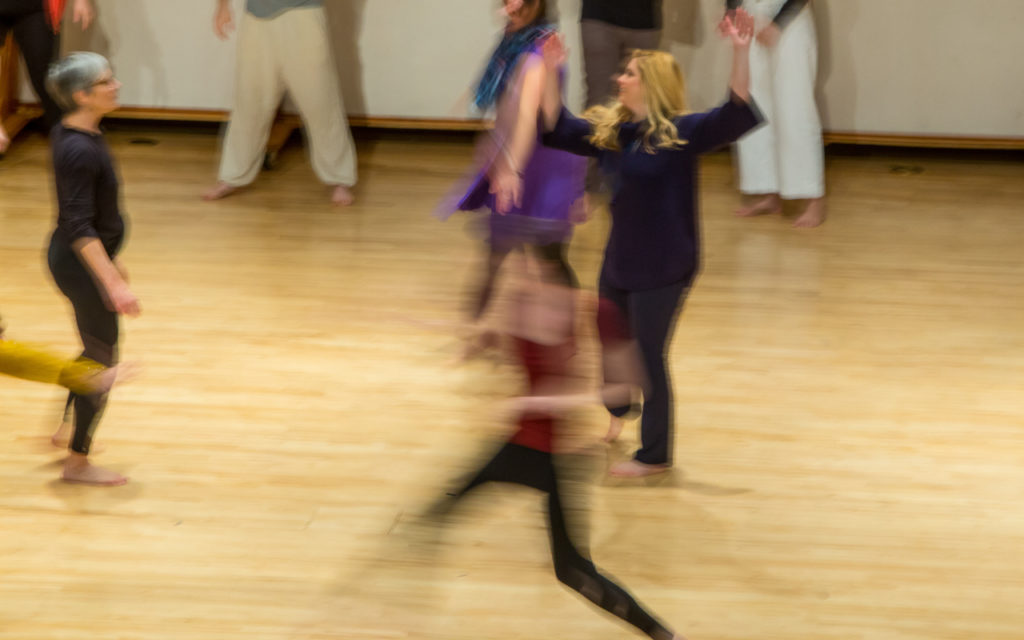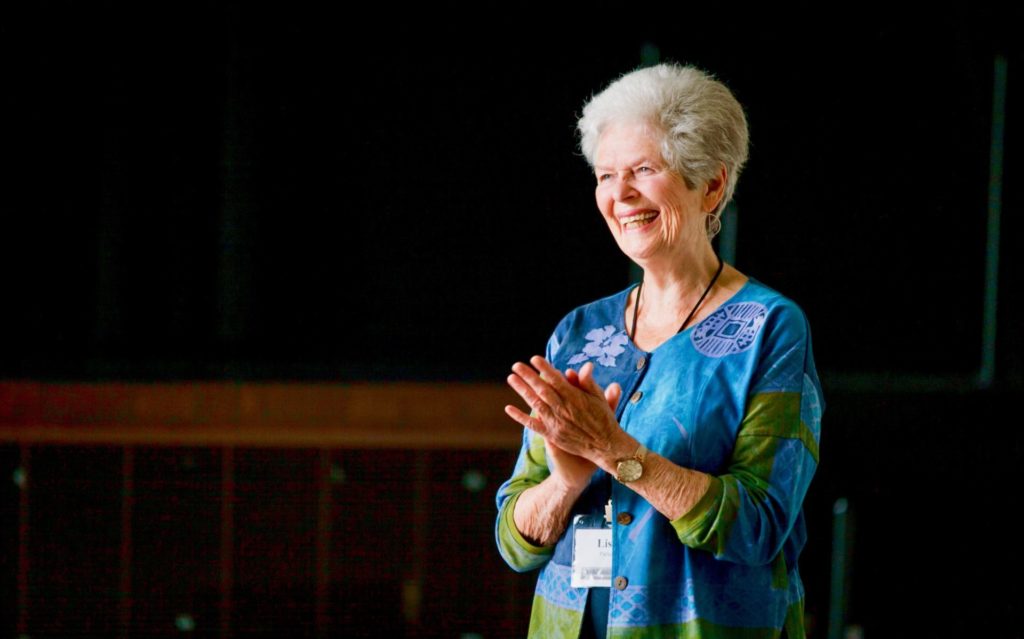
Introducing: Professional Teacher Outreach Support
Are you a DSA member who first learned about Dalcroze Education while attending a professional conference, or a professional teacher who has had the opportunity to teach at a conference? National and state events are one of the best ways we can share our unique work with others. In an effort to help teachers who plan to present at conferences and increase exposure to our work with a wider audience, the DSA board of trustees spent much of last year developing a new opportunity for members: The Professional Teachers Outreach Support grant, or PTOS.
Alignment with the DSA’s Mission and Strategic Plan
The PTOS program aligns with the DSA’s Mission Statement numbers one and three:
- 1. Sustain and expand the professional practice of Dalcroze Education in the USA and in the world.
- 3. Raise the general public’s awareness and appreciation of Dalcroze Education.
This program aligns with goals two and three in our Strategic Plan:
- 2. Increase in-person opportunities offered by the DSA and DSA chapters. Increase opportunities throughout the United States for anyone interested in the Dalcroze work to gather together for enrichment, education or other activities that explore the body of Dalcroze work.
- 3. Increase the number of people engaging with Dalcroze content and experiences. Increase awareness around the opportunities that the DSA and Dalcroze offer by strengthening marketing efforts for existing opportunities and materials. Identify ways to increase membership and retain current members, continue and bolster scholarship offerings, and identify potential new areas of opportunity.
Description and Feasibility
The goal of the PTOS initiative is to generate interest in our practice, increase membership in the DSA, and, ultimately, stimulate participation in teacher-training at US training programs. The motivation for this project is the organization’s desire to reach out to “Dalcroze Deserts” and new populations of potential DSA members. (“Dalcroze Deserts,” here refers to specific geographic locations, teaching specialties, or untapped communities.)
While conference presentations undoubtedly benefit the session facilitator, this project must be designed specifically to benefit the DSA. Because this is a completely new undertaking for us, we don’t have empirical evidence to support or disprove efficacy. Thus, we suggest a two- or three-year pilot project to determine if funding should continue.
The alternative to this outreach effort is to encourage our PDC members and other Licentiates to continue to reach out to areas where they see the most need. A more intentional organizational approach will likely benefit the DSA more than “hoping” our leaders in teaching will remember or be willing to represent the DSA as much as themselves. The PTOS grant program has the potential to ensure this goal.

Scope and Cost
The DSA board will control funding for this initiative for the trial phase (2 years), which allows for discerning disbursement of funding to individuals (similar to our current practice in scholarship awards).
The PTOS task force suggests the following should the DSA decide to move forward:
- Limit funding to organizations dedicated to music teaching and performance (MTNA, NAfME, Alliance for Active Music Making, Suzuki, AOSA)
- Cap individual funding at $500 dollars, awarding a maximum of three awards annually.
- Require recipients to include DSA membership information on any handouts and include a statement such as “XXX is a member of the Dalcroze Society of America” in any identifying or bio info.
- Provide a QR code that workshop participants can use for discounted ($5?) membership; scanning the code would allow us to track the number of individuals who access the website and/or become DSA members after participating in the workshop. Alternatively, the DSA could offer workshop participants a short (one to three month) free membership so that they can get a taste of the benefits. Access will require an email address. The DSA should provide notification to these “new members” when their temporary membership is about to expire.
- The QR code would include a short survey about the presentation that would need to be completed before the discounted/free membership is established.
The above would allow the DSA to assess success of the program based on the number of people who access the website and become “temporary” members. We (the PTOS Task Force) believe this program can attract new members; it’s up to the DSA to motivate continued membership.
Finance committee recommendations for funding
Use Lisa Parker fund for the first year ($900) and in the 2nd year evaluate use of Julia Shnebly-Black donation fund.

Benchmarks, Evaluation, Quality Control
Ideally, this program will attract 3-5 new DSA members per presentation each fiscal year, for a total of 15 new members per year.
Evaluation will be three-fold:
- Endorsement by two DSA-members with teaching credentials of the applicant as a part of the application.
- Post-event evaluation, via a short survey, completed by participants who choose to further investigate the DSA.
- A written report to the Board by awardees after the event.
PTOS Application Form
Professional Teacher Outreach Support Grant Description
The purpose of Professional Teacher Outreach Support grants is two-fold: to support members by making the financial burden of Conference presentations more accessible, and to develop awareness of and interest in the Dalcroze Society of America for conference attendees.
Towards this end, the DSA is seeking to support applicants presenting at conferences focused on classroom music teaching, private teaching, early childhood education, and related music fields, such as music therapy. We also seek to support teachers presenting at conferences in “Dalcroze Deserts” (specifically, in geographic locations devoid of active Dalcroze clinicians or in untapped communities).
Applications are accepted throughout the fiscal year (July 1- June 30) and will be awarded on a rolling basis. We encourage applicants to apply as early as possible. The DSA will allocate $1500 toward three awards per fiscal year. Each awardee can claim reimbursement up to $500. Please note that the DSA will reimburse only expenses not already covered by the organization for which you are presenting. Eligible expenses include:
- Travel costs
- Room and board
- Conference fees, if applicable
Presenters should provide receipts within two weeks of the event and can expect reimbursement within 30 days after receipt.
In exchange for funding for your presentation, awardees agree to
- Include DSA membership information on any handouts and indicate “xxx is a member of the Dalcroze Society of America”
- Provide a QR code presentation attendees can use for discounted DSA membership; the code will require a brief survey about the evaluation.
- Provide printed materials about the DSA to attendees. (Materials will be provided to the presenter.)
- Write a short (2-3 paragraph) report about the presentation for DSA Board members. (Include the # of attendees, any feedback, other observations that might help grow the DSA or how the DSA might piggyback on future events to help increase interest and membership)
PTOS Application
- Name:
- Dalcroze Credential:
- CV/Resume (Note: CV should include current or recent teaching experience and conference presentation experience). Upload
- Name, date, and location of conference:
- Title and brief description of your presentation.
- Intended audience of your presentation (preschool teachers, music ed, instrumental teachers, teachers in other disciplines, etc.):
- Please provide a short (150-200 word) description of how your presentation will benefit the DSA and serve the local music practitioner community.
- Has your conference proposal already been accepted?
- If not, what is the anticipated notification date?
- Are you being compensated for your presentation by the host organization?
Yes ___. No ___
If so, complete the following to indicate your total compensation:
$50-100 ______
100-250 ______
$250-500 ______
$500+ ______
- Your estimated budget:
- Housing/board
- Travel (mileage, to be paid at current IRS rate, rental car fee, airfare)
- Conference Registration (if applicable)
- Please list any expenses that will be paid by the hosting organization or other sources of funding.
- Please name and provide contact information for two DSA members with Dalcroze teaching credentials to endorse your work.
Please initial each box below, indicating that you agree to represent the DSA as follows:
I agree to:
_____ Include DSA membership information on any handouts and indicate “xxx is a member of the Dalcroze Society of America”
_____ Provide a QR code presentation attendees can use for discounted DSA membership
_____ Provide printed materials about the DSA to attendees.
_____ Write a short (2-3 paragraph) report about the presentation for DSA Board members. (Include the # of attendees, any feedback, other observations that might help grow the DSA or how the DSA might piggyback on future events to help increase interest and membership)
This is an exciting venture for the DSA membership! Members of the Dalcroze Society of America can apply for PTOS grants beginning in the 2024-2025 academic year. Not a member? Join instantly online.